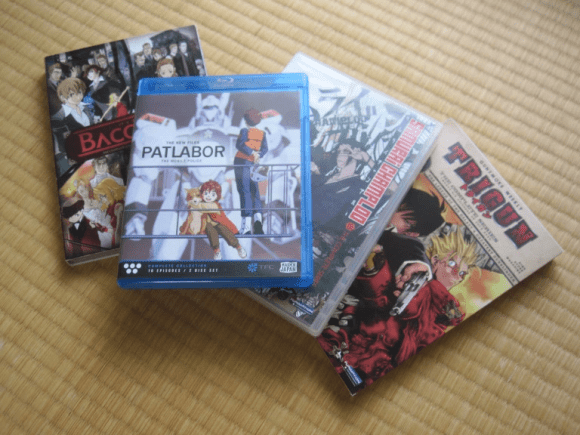
Director of Fullmetal Alchemist thinks fans have twice as many series as they really need.
Being an anime otaku is all about a ravenous hunger and obsessive interest in the medium, but in recent years more than a few fans are starting to feel like there’s such a thing as too much content. Each 13-week Japanese TV season sees the debut of dozens of new series, and it’s now virtually impossible for viewers to stay up-to-date with every currently airing franchise, contributing to fan burnout and the possibility of genuinely high-quality shows getting lost in the crowd and never finding their audience.
Seiji Mizushima is one of the people such concerns weigh heavily upon, but he’s not just some fan with a massive backlog of episodes he doesn’t have time to watch. Mizushima is a pro who’s been working in the anime field for more than two decades, directing hits including the 2003 Fullmetal Alchemist and Gundam 00 TV series, and he recently took to Twitter with a bold proposal for how to improve the industry.
アニメ、今の半分でも誰も困らないと思うんだよなー。同じクールに2本やってる監督とかも居るし、大変だろうに。供給過多でしょう。視聴者はどうやったって全部見れないし、現場は常に人材不足だし。何のために作ってるんだろうなぁ……。一つ一つちゃんと作れた方が良いんだけどな。
— 水島 精二 (@oichanmusi) June 24, 2018
“I don’t think anyone would be worse off if the amount of anime getting made was cut in half. Some directors are even handling two shows in the same season, which is an incredibly tough schedule. There’s just an excess supply of content, and there are never enough people in the studio to get work done. What is the point in making so much anime? It’d be better to do a proper job of making series one by one.”
Many other Twitter users shared Mizushima’s frustration, leaving comments such as:
“Yeah, half as many series would be great. I can only watch, at maximum, like 10 shows a season, and only finish like six of them. I liked it better back in the day when one series was 26 to 50 episodes.”
“There are just too many shows. It’d be OK if they were all high-quality, but so many are one-season shows that end in like 12 episodes, then everyone forgets about them before the fanbase can build up any foundation.”
“There’s no way I can watch them all, and a lot of series have really similar titles and stories.”
“I wish they’d go back to how it was in the old days, when one series would run for an entire year. And I agree there should be fewer series. I want them to have plenty of time to do a good job.”
“With all the time it takes to keep up with what’s currently airing, when do people who buy Blu-rays watch them?”
As mentioned by multiple commenters, it used to be the norm for anime to run at least 26 episodes, shown over the course of six months. By shifting to 13-episode runs, with the potential for sequel series if the show turns out to be a hit, anime creators don’t have nearly as much time to differentiate their works from other examples within the same genre, which can result in them feeling generic and uninteresting.
However, it’s worth bearing in mind that the unprecedented amount of anime being made today also includes some niche shows that are designed to scratch a very particular itch. For example, this spring Uma Musume was a solid success, but it’s hard to imagine how a historical race horse schoolgirl lesbian idol singer anime could have ever been produced except in an era when the industry is saying “Sure, let’s put that on TV and see if anyone watches it” to just about anything.
▼ Uma Musume
There’s also the fact that while Japanese animation may not have the “just-for-kids” image of its Western counterpart, anime is still very much a youth-oriented form of entertainment, primarily aimed at students and working 20-somethings without the time drains of family life or later-stage adulthood. The “too much anime” complaint might stem, in part, from fans having to adjust their media consumption habits as they get older, exit the largest fan demographic, and can no longer select “all of them” when choosing which anime to watch. After all, people would call you crazy if you said you wanted to watch every episode of every current live-action fictional TV series, and they’d do the same if you grumbled about not having time to watch every live-action movie that came out.
Still, anime is unique in that while it’s technically just a medium, there tends to be a lot more consumer crossover across genres than with live-action storytelling, which makes market oversaturation easier to occur. It’s also a basic law of economics that there exists, somewhere, a maximum total amount of demand for any entertainment product, and when supply gets greater than that, bad things are bound to happen, so maybe Mizushima has a point when he says the anime industry should slow things down a notch.
Source: Twitter/@oichanmusi via Hachima Kiko
Top image ©SoraNews24
Follow Casey on Twitter where, oversaturated market or not, he still wants a new Patlabor anime.

 Netflix’s Fullmetal Alchemist: It doesn’t suck
Netflix’s Fullmetal Alchemist: It doesn’t suck Fullmetal Alchemist prequel manga’s cover, plot details revealed in runup to live-action film
Fullmetal Alchemist prequel manga’s cover, plot details revealed in runup to live-action film New live-action Fullmetal Alchemist trailer shows off Ed’s mechanical arm, brother-in-armor Al
New live-action Fullmetal Alchemist trailer shows off Ed’s mechanical arm, brother-in-armor Al Supporting cast of live-action Fullmetal Alchemist movie appears in costume for first time【Video】
Supporting cast of live-action Fullmetal Alchemist movie appears in costume for first time【Video】 Japanese restaurant chain serves Dragon Ball donuts and Senzu Beans this spring
Japanese restaurant chain serves Dragon Ball donuts and Senzu Beans this spring Japan’s craziest burger chain takes menchi katsu to new extreme levels
Japan’s craziest burger chain takes menchi katsu to new extreme levels Starbucks Japan releases first-ever Hinamatsuri Girls’ Day Frappuccino
Starbucks Japan releases first-ever Hinamatsuri Girls’ Day Frappuccino Highest Starbucks in Japan set to open this spring in the Tokyo sky
Highest Starbucks in Japan set to open this spring in the Tokyo sky Japanese high school students hatch chick without an eggshell during class【Video】
Japanese high school students hatch chick without an eggshell during class【Video】 Hello Kitty isn’t a cat!? We called Sanrio to find out!
Hello Kitty isn’t a cat!? We called Sanrio to find out! Drift ice in Japan is a disappearing winter miracle you need to see now
Drift ice in Japan is a disappearing winter miracle you need to see now Anime sword fighting isn’t like reality. Why? Biomechanics (again)
Anime sword fighting isn’t like reality. Why? Biomechanics (again) Japanese gravure idol strips down, plays drums to anime hits【Videos】
Japanese gravure idol strips down, plays drums to anime hits【Videos】 Anime isn’t like reality: Terrifying dentistry edition
Anime isn’t like reality: Terrifying dentistry edition Tokyo Skytree turns pink for the cherry blossom season
Tokyo Skytree turns pink for the cherry blossom season Yakuzen ramen restaurant in Tokyo is very different to a yakuza ramen restaurant
Yakuzen ramen restaurant in Tokyo is very different to a yakuza ramen restaurant Japan Extreme Budget Travel! A trip from Tokyo to Izumo for just 30,000 yen [Part 1]
Japan Extreme Budget Travel! A trip from Tokyo to Izumo for just 30,000 yen [Part 1] Japan has only one airport named after a samurai, so let’s check out Kochi Ryoma【Photos】
Japan has only one airport named after a samurai, so let’s check out Kochi Ryoma【Photos】 Japanese drugstore sells onigiri at pre-stupid era prices, but how do they compare to 7-Eleven?
Japanese drugstore sells onigiri at pre-stupid era prices, but how do they compare to 7-Eleven? Burning through cash just to throw things away tops list of headaches when moving house in Japan
Burning through cash just to throw things away tops list of headaches when moving house in Japan Starbucks Japan releases new sakura goods and drinkware for cherry blossom season 2026
Starbucks Japan releases new sakura goods and drinkware for cherry blossom season 2026 Japan’s newest Shinkansen has no seats…or passengers [Video]
Japan’s newest Shinkansen has no seats…or passengers [Video] Foreigners accounting for over 80 percent of off-course skiers needing rescue in Japan’s Hokkaido
Foreigners accounting for over 80 percent of off-course skiers needing rescue in Japan’s Hokkaido Super-salty pizza sends six kids to the hospital in Japan, linguistics blamed
Super-salty pizza sends six kids to the hospital in Japan, linguistics blamed Starbucks Japan unveils new sakura Frappuccino for cherry blossom season 2026
Starbucks Japan unveils new sakura Frappuccino for cherry blossom season 2026 Foreign tourists in Japan will get free Shinkansen tickets to promote regional tourism
Foreign tourists in Japan will get free Shinkansen tickets to promote regional tourism The 10 most annoying things foreign tourists do on Japanese trains, according to locals
The 10 most annoying things foreign tourists do on Japanese trains, according to locals Take a trip to Japan’s Dododo Land, the most irritating place on Earth
Take a trip to Japan’s Dododo Land, the most irritating place on Earth Naruto and Converse team up for new line of shinobi sneakers[Photos]
Naruto and Converse team up for new line of shinobi sneakers[Photos] Is China’s don’t-go-to-Japan warning affecting the lines at a popular Tokyo gyukatsu restaurant?
Is China’s don’t-go-to-Japan warning affecting the lines at a popular Tokyo gyukatsu restaurant? Survey asks foreign tourists what bothered them in Japan, more than half gave same answer
Survey asks foreign tourists what bothered them in Japan, more than half gave same answer Japan’s human washing machines will go on sale to general public, demos to be held in Tokyo
Japan’s human washing machines will go on sale to general public, demos to be held in Tokyo Starbucks Japan releases new drinkware and goods for Valentine’s Day
Starbucks Japan releases new drinkware and goods for Valentine’s Day We deeply regret going into this tunnel on our walk in the mountains of Japan
We deeply regret going into this tunnel on our walk in the mountains of Japan Studio Ghibli releases Kodama forest spirits from Princess Mononoke to light up your home
Studio Ghibli releases Kodama forest spirits from Princess Mononoke to light up your home Major Japanese hotel chain says reservations via overseas booking sites may not be valid
Major Japanese hotel chain says reservations via overseas booking sites may not be valid Put sesame oil in your coffee? Japanese maker says it’s the best way to start your day【Taste test】
Put sesame oil in your coffee? Japanese maker says it’s the best way to start your day【Taste test】 No more using real katana for tourism activities, Japan’s National Police Agency says
No more using real katana for tourism activities, Japan’s National Police Agency says Fullmetal Alchemist to complete live-action adaptation with two new movies【Video】
Fullmetal Alchemist to complete live-action adaptation with two new movies【Video】 Where’d the time go?! Top anime series that finished ten years ago, ranked by Japanese netizens
Where’d the time go?! Top anime series that finished ten years ago, ranked by Japanese netizens Fullmetal Alchemist shoes are here to complete fashionable anime fans’ footwear collections
Fullmetal Alchemist shoes are here to complete fashionable anime fans’ footwear collections Female otaku has perfectly sensible answer for when people ask why she doesn’t get a boyfriend
Female otaku has perfectly sensible answer for when people ask why she doesn’t get a boyfriend Donations pouring in from foreign Uma Musume fans for Japan’s real-life loveable loser racehorse
Donations pouring in from foreign Uma Musume fans for Japan’s real-life loveable loser racehorse Finally! Attack on Titan director says TV anime’s second season will start production in 2016
Finally! Attack on Titan director says TV anime’s second season will start production in 2016 Netflix is making a live-action, U.S.-made One Piece series with original creator as producer
Netflix is making a live-action, U.S.-made One Piece series with original creator as producer Fruits Basket’s brand-new complete anime adaptation has a touching new preview video
Fruits Basket’s brand-new complete anime adaptation has a touching new preview video Akihabara capsule toy lucky bag is filled with cute characters and cool crap (literally)【Photos】
Akihabara capsule toy lucky bag is filled with cute characters and cool crap (literally)【Photos】 Pokémon of the Year results announced, and Pikachu wasn’t even close to winning【Video】
Pokémon of the Year results announced, and Pikachu wasn’t even close to winning【Video】 What’s the best Rumiko Takahashi anime of all time? Fans decide, pick best characters too【Survey】
What’s the best Rumiko Takahashi anime of all time? Fans decide, pick best characters too【Survey】 What’s wrong with Netflix’s live-action Cowboy Bebop? The characters, our old-school fan says
What’s wrong with Netflix’s live-action Cowboy Bebop? The characters, our old-school fan says Episode of Gunma-chan anime deemed not suitable for children and shelved
Episode of Gunma-chan anime deemed not suitable for children and shelved Five anime scenarios Japanese fans are sick of seeing【Survey】
Five anime scenarios Japanese fans are sick of seeing【Survey】 This fall is going to be insane for anime, says our resident otaku reporter
This fall is going to be insane for anime, says our resident otaku reporter